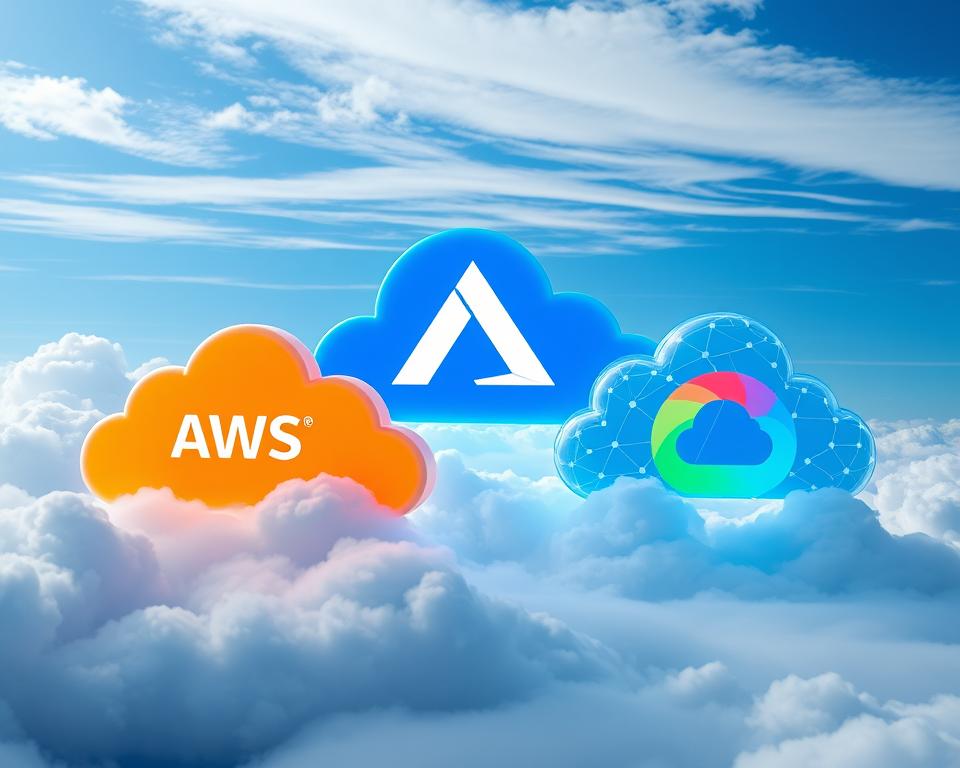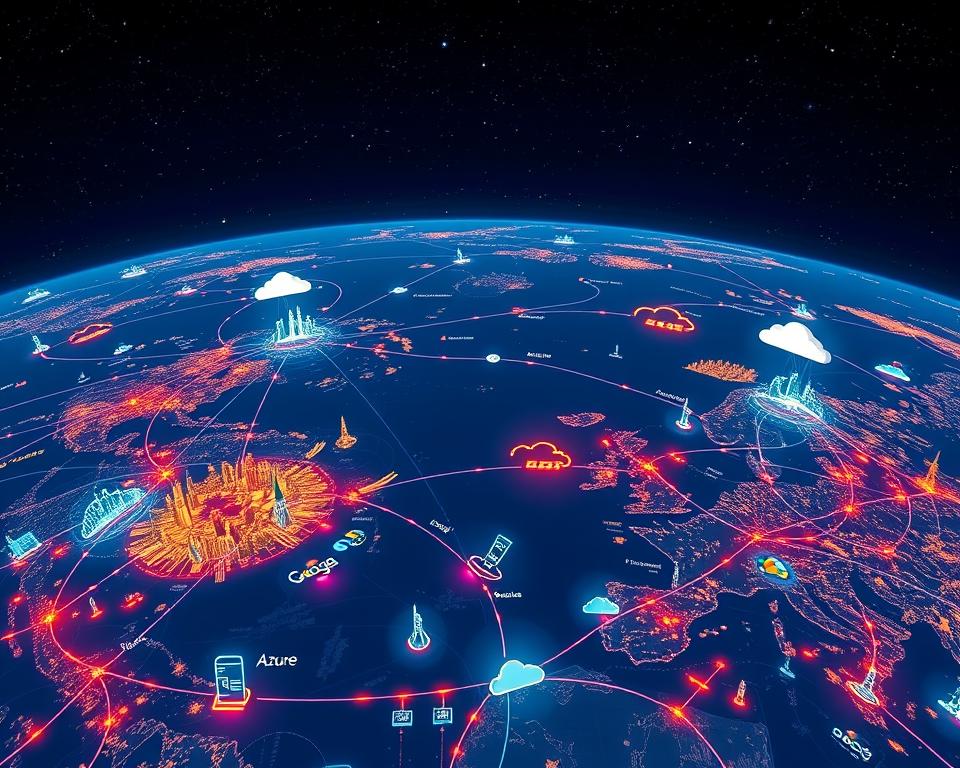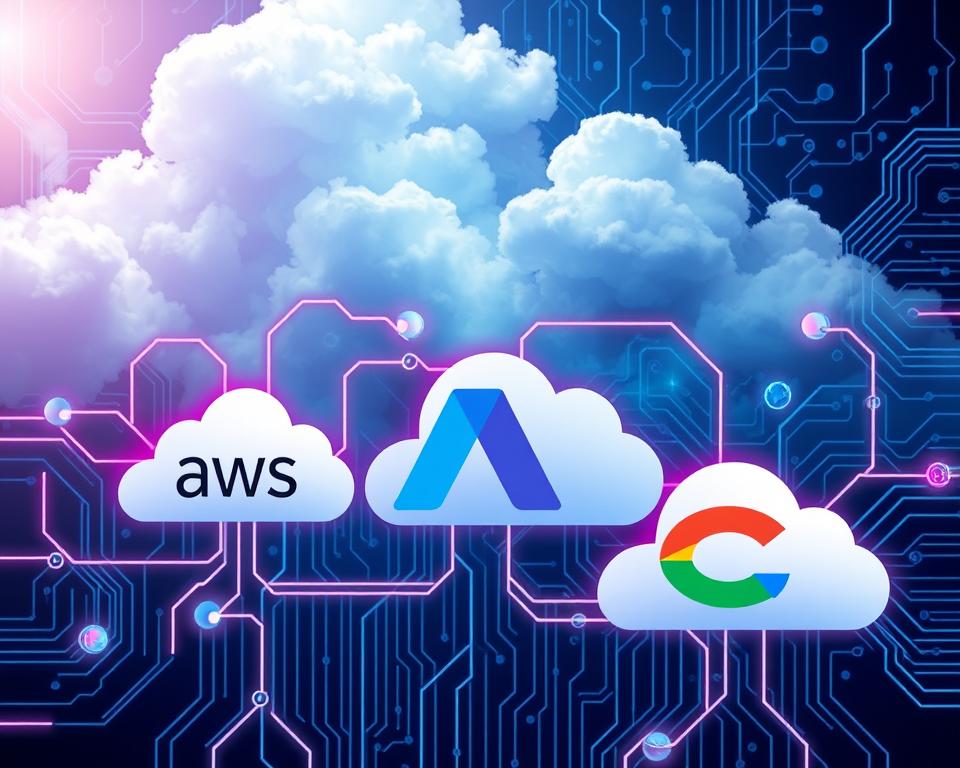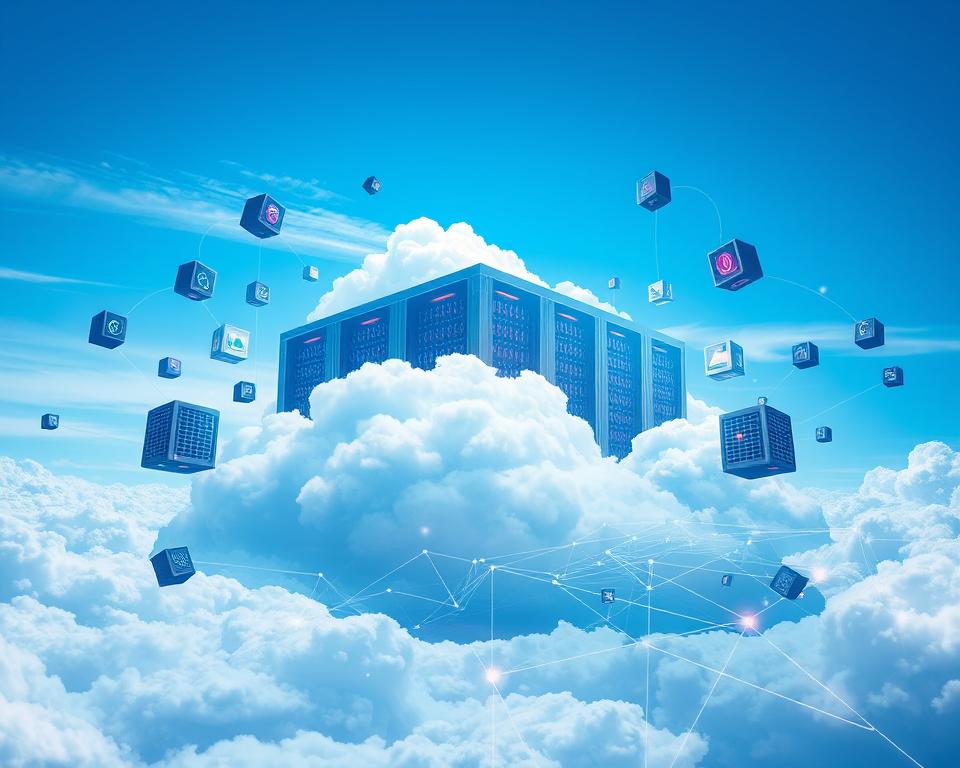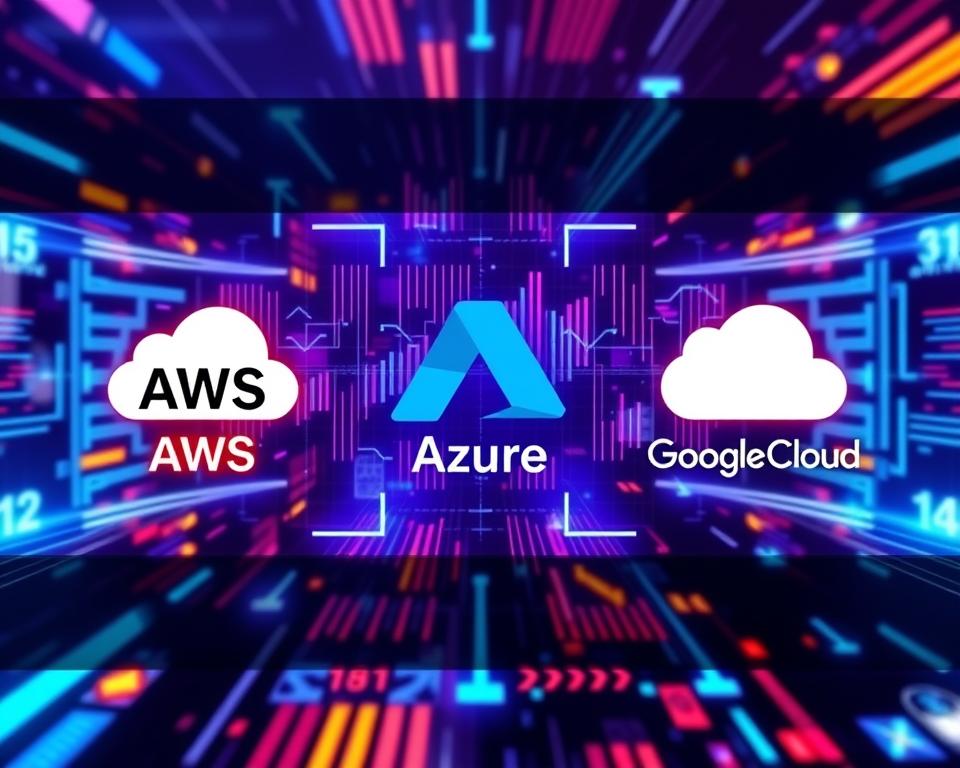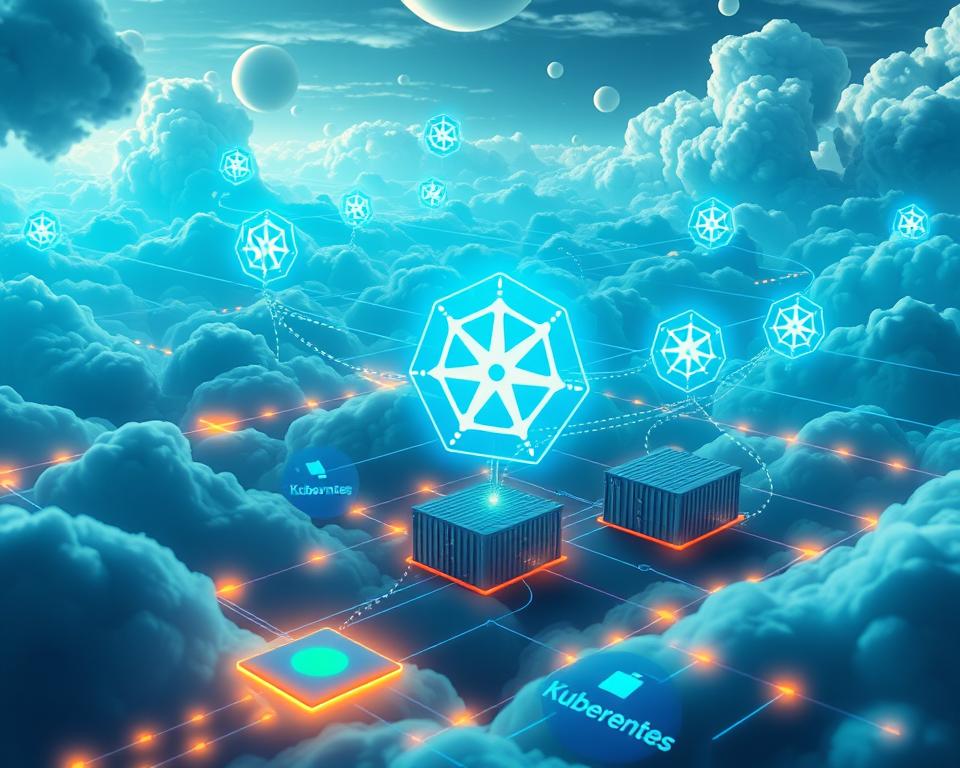The world of cloud computing has changed a lot. Now, we have three big players: Amazon Web Services (AWS), Microsoft Azure, and Google Cloud Platform (GCP). They have changed how we use computing resources. They offer many services to help businesses and individuals in the digital world.
This guide compares AWS, Azure, and GCP. It helps you choose the best cloud provider for your needs. We’ll look at pricing, infrastructure, computing services, storage, and more. This will help you understand the differences and make a smart choice for your business.
Table of Contents
Key Takeaways
- Explore the evolution and market share distribution of the top cloud platforms: AWS, Azure, and GCP.
- Understand the global infrastructure and data center coverage offered by each cloud provider.
- Analyze the pricing models, cost management tools, and pay-as-you-go options available.
- Compare the computing services, virtual machines, storage solutions, and data management capabilities.
- Evaluate the security features, compliance standards, and identity management offered by the cloud platforms.
- Discover the database services, container solutions, and Kubernetes support across the three providers.
- Investigate the machine learning, AI, networking, and CDN capabilities of AWS, Azure, and GCP.
Understanding Cloud Computing Platforms: The Big Three
The demand for cloud computing is growing fast. The “Big Three” – AWS, Microsoft Azure, and Google Cloud – lead the way. They offer a wide range of services to meet the needs of businesses.
Evolution of Cloud Services
The cloud computing world has changed a lot. It started as a simple way to host and store data. Now, it’s a full ecosystem with computing, networking, database, and AI/ML capabilities. The Big Three keep adding new services, making the enterprise cloud and hybrid cloud even better.
Market Share Distribution
Recent reports show AWS leads with about 33% of the market. Microsoft Azure has around 21%, and Google Cloud has 10%. This mix of players makes the cloud market very competitive and innovative.
Key Differentiators
Each Big Three platform has its own strengths. AWS is known for its wide range of services and detailed documentation. Microsoft Azure is great for those already using Microsoft products. Google Cloud stands out for its advanced cloud adoption features, like AI and data analytics.
“The cloud computing market is no longer a two-horse race; it has become a dynamic and competitive landscape where enterprises can leverage the unique strengths of each platform to unlock their full potential.”
Global Infrastructure and Data Center Coverage
Leading cloud platforms like AWS, Azure, and Google Cloud have a big impact on services worldwide. They have many availability zones, regions, and edge locations. This helps ensure data stays where it should and makes disaster recovery easier.
AWS has the biggest global setup, with 26 regions and 84 availability zones. It covers many parts of the world. Microsoft Azure is close behind, with 60 regions and over 200 edge locations. This gives customers a wide reach.
| Cloud Platform | Regions | Availability Zones | Edge Locations |
|---|---|---|---|
| AWS | 26 | 84 | 275 |
| Microsoft Azure | 60 | 220+ | 200+ |
| Google Cloud | 25 | 76 | 100+ |
Google Cloud, though smaller, still has a strong global presence. It has 25 regions and 76 availability zones. This network helps these platforms offer fast, reliable, and diverse services. They meet the need for data sovereignty, disaster recovery, and edge content delivery.
Pricing Models and Cost Management Tools
Understanding cloud pricing can be tough. But, knowing the different models and tools from AWS, Azure, and Google Cloud helps. These platforms offer various pricing strategies for businesses of all sizes.
Pay-as-you-go Options
The pay-as-you-go model is popular. It lets users scale resources without long-term commitments. It’s great for businesses with changing needs, as they only pay for what they use.
Reserved Instance Pricing
Reserved instance pricing is good for steady workloads. It saves money by offering discounts for long-term commitments. It’s perfect for resources always in use, like databases or web servers.
Cost Optimization Features
- Advanced cloud pricing calculator tools to estimate and manage costs
- Detailed TCO (Total Cost of Ownership) analysis
- Budget alerts to monitor and control spending
- Cost allocation tags for detailed cost tracking and reporting
These features help businesses understand their cloud costs. They make it easier to manage cloud spending and make smart choices.
Computing Services and Virtual Machines
The big players in cloud computing – AWS, Azure, and Google Cloud – have a wide range of services. They offer virtual machines (VMs) for different needs. These VMs give the power and resources needed for many applications.
AWS leads with its EC2 (Elastic Compute Cloud) instances. It has many VM types for various needs. Azure has Azure Virtual Machines (VMs) for similar needs. Google Cloud’s Google Compute Engine (GCE) VMs offer flexibility and scalability.
Auto-scaling is a key feature of these platforms. AWS, Azure, and Google Cloud all have strong auto-scaling. This lets businesses adjust resources as needed, without manual effort.
| Feature | AWS EC2 | Azure VMs | Google Compute Engine |
|---|---|---|---|
| Instance Types | Wide variety, including general-purpose, compute-optimized, memory-optimized, and GPU-accelerated options | Diverse range of VMs, including burstable, general-purpose, memory-optimized, and GPU-enabled | Extensive selection of instance types, catering to various workloads and performance requirements |
| Auto-Scaling | Robust auto-scaling capabilities, seamlessly adjusting resources based on demand | Flexible auto-scaling features, enabling dynamic scaling of VMs to handle fluctuating workloads | Powerful auto-scaling functionality, automatically scaling computing resources as needed |
| Serverless Computing | Offers Lambda, a serverless compute service, for event-driven and scalable applications | Provides Azure Functions, a serverless compute service, for building serverless applications | Integrates with Cloud Functions, a fully managed serverless compute service, for building scalable applications |
These platforms also offer serverless computing. This lets businesses focus on apps without managing infrastructure. AWS has Lambda, Azure has Azure Functions, and Google Cloud has Cloud Functions. Each helps build scalable, event-driven apps.
As more businesses use cloud computing, knowing about AWS, Azure, and Google Cloud is key. Choosing the right platform helps unlock the cloud’s full potential. This drives digital transformation forward.
Storage Solutions and Data Management
In cloud computing, storage solutions are key for managing and accessing data. Big cloud platforms like AWS, Azure, and Google Cloud offer many storage options. They meet different needs of businesses and people, with features like block, object, and file storage.
Block Storage Options
Block storage is known as S3 in AWS, Azure Blob Storage in Azure, and Google Cloud Storage in Google Cloud. It’s great for storing structured data. It’s durable and fast, perfect for VM images, database files, and critical apps.
Object Storage Capabilities
Object storage is best for unstructured data like documents and images. S3, Azure Blob Storage, and Google Cloud Storage are top choices. They handle large data volumes well, with features for archiving and content sharing.
File Storage Systems
Cloud platforms also have file storage systems like EBS in AWS, Azure Files in Azure, and Google Cloud’s file storage. These systems make sharing and collaborating on files easy, across devices and locations.
Understanding cloud storage solutions is vital in today’s tech world. By using each platform’s strengths, businesses can improve their data management. This ensures they have efficient, secure, and scalable storage for their needs.
AWS vs Azure vs Google Cloud: Performance Comparison
When picking a cloud computing platform, performance is key. Let’s look at the latency, throughput, IOPS, and network performance of AWS, Azure, and Google Cloud.
AWS often leads in compute performance with higher benchmarks and throughput. This is thanks to AWS’s long experience and ongoing improvements in hardware and software.
| Metric | AWS | Azure | Google Cloud |
|---|---|---|---|
| Compute Performance | High | Moderate | Moderate |
| Storage IOPS | High | Moderate | High |
| Network Latency | Low | Moderate | Low |
| Database Throughput | High | Moderate | High |
AWS and Google Cloud usually have better IOPS than Azure. This is crucial for apps needing lots of I/O.
AWS and Google Cloud also have lower latency than Azure. This is good for apps needing quick responses.
Keep in mind, performance can change based on your specific needs and choices. Always test and benchmark to find the best cloud for you.
Security Features and Compliance Standards
Security and compliance are key in cloud computing. Let’s look at how AWS, Azure, and Google Cloud compare in identity management, encryption, and regulatory support.
Identity Management
Each major cloud platform has strong identity and access management (IAM) solutions. AWS IAM lets you control user permissions and access. Azure Active Directory (Azure AD) offers a full identity management system. Google Cloud’s Identity-Aware Proxy (IAP) ensures secure access to apps and resources.
Encryption Capabilities
Encryption is vital for protecting data at rest and in transit. AWS, Azure, and Google Cloud all offer native encryption options. They also support TLS for secure data transmission.
Regulatory Compliance
The top cloud providers have many compliance certifications, like GDPR, HIPAA, and SOC 2. These show their dedication to security and privacy standards. Customers can use these frameworks to meet necessary guidelines.
| Security Feature | AWS | Azure | Google Cloud |
|---|---|---|---|
| IAM | AWS IAM | Azure Active Directory | Identity-Aware Proxy (IAP) |
| Encryption at Rest | Amazon EBS, S3 SSE | Azure Disk Encryption, Blob Storage SSE | Google Cloud Storage CSEK, CMEK |
| Encryption in Transit | TLS 1.2 | TLS 1.2, HTTPS | TLS 1.2, HTTPS |
| Compliance Certifications | GDPR, HIPAA, SOC 2 | GDPR, HIPAA, SOC 2 | GDPR, HIPAA, SOC 2 |
Knowing the security and compliance features of AWS, Azure, and Google Cloud helps organizations choose the right cloud platform. This choice should match their security needs and industry regulations.
Database Services and Solutions
In the world of cloud computing, picking the right database services is key for businesses. AWS, Microsoft Azure, and Google Cloud offer a wide range of database solutions. They have everything from relational databases to NoSQL options and data warehousing.
Relational databases are still a big deal in the cloud. They offer top-notch features, scalability, and reliability. AWS RDS, Azure SQL Database, and Google Cloud SQL make it easy to manage SQL engines like MySQL and PostgreSQL.
Cloud providers have also improved NoSQL databases a lot. Services like Amazon DynamoDB and Google Cloud Datastore are great for flexible data storage. They’re perfect for handling big data and real-time apps.
For big data needs, cloud data warehousing is the way to go. Amazon Redshift and Google BigQuery are powerful tools. They help businesses find insights in large datasets and work well with other analytics tools.
| Database Service | AWS | Microsoft Azure | Google Cloud |
|---|---|---|---|
| Relational Database | Amazon RDS | Azure SQL Database | Cloud SQL |
| NoSQL Database | Amazon DynamoDB | Azure Cosmos DB | Google Cloud Datastore |
| Data Warehousing | Amazon Redshift | Azure Synapse Analytics | Google BigQuery |
Choosing the right database services is crucial for app success. Knowing what AWS, Azure, and Google Cloud offer helps businesses make the best choice. This choice affects app performance, scalability, and success.
Container Services and Kubernetes Support
The cloud computing world has seen a big jump in using container technologies. Docker and Kubernetes are leading the way. Cloud giants like AWS, Azure, and Google Cloud have noticed this trend. They’ve invested a lot to meet the needs of today’s app development and deployment.
Managed Kubernetes Offerings
Each cloud platform has its own managed Kubernetes service. Amazon Elastic Kubernetes Service (EKS), Azure Kubernetes Service (AKS), and Google Kubernetes Engine (GKE) are the names. These services make it easier to manage container apps. They handle the complex setup, so developers can focus on their work.
Container Registry Options
Cloud providers also offer container registries for Docker images. Amazon Elastic Container Registry (ECR), Azure Container Registry (ACR), and Google Container Registry (GCR) are the native registries. They work well with the Kubernetes services and other cloud services.
| Feature | AWS | Azure | Google Cloud |
|---|---|---|---|
| Managed Kubernetes Service | Amazon EKS | Azure AKS | Google GKE |
| Container Registry | Amazon ECR | Azure ACR | Google GCR |
| Container Orchestration | EKS, Docker | AKS, Docker | GKE, Docker |
Cloud providers offer strong container services and work well with Kubernetes. This helps organizations manage their container apps smoothly. They get the benefits of container orchestration and the cloud’s flexibility.
Machine Learning and AI Capabilities
In cloud computing, using advanced machine learning (ML) and artificial intelligence (AI) is key. The big three – AWS, Azure, and Google Cloud – each have strong ML and AI services. These help businesses and developers a lot.
AWS SageMaker makes it easy to build, train, and use ML models. Azure Machine Learning has tools for data scientists and developers to work on ML models. Google’s AI Platform helps with ML and deep learning models, including TensorFlow.
These platforms have pre-built AI services for tasks like natural language processing and computer vision. They also have tools for training and deploying ML and AI. This makes it easy to add AI to different applications.
When picking a cloud platform for ML and AI, think about ease of use, scalability, and performance. Also, look at the pre-built AI services that fit your needs. Using each platform’s strengths can help businesses innovate and stay ahead.
“The future of every business will be defined by the speed at which it embraces AI and machine learning.”
Networking Features and CDN Services
Cloud computing relies on networking and content delivery networks (CDNs) for smooth connections and fast content sharing. AWS, Azure, and Google Cloud each have strong networking features and CDN services. They meet different user needs.
Load Balancing Options
Load balancing is key for handling traffic and keeping services up and running. AWS has Elastic Load Balancing with Application, Network, and Classic Load Balancers. Azure and Google Cloud also offer load balancing services. These help spread traffic evenly, keeping apps running smoothly.
VPN and Direct Connect
VPN and Direct Connect ensure safe cloud connections. AWS VPC and Azure Virtual Network create private cloud networks for secure communication. AWS Direct Connect and Azure ExpressRoute offer fast, dedicated connections to the cloud.
AWS, Azure, and Google Cloud also have CDN services. CloudFront, Azure CDN, and Cloud CDN speed up content delivery. They cache and distribute data globally, cutting down on latency and improving user experience.
| Feature | AWS | Azure | Google Cloud |
|---|---|---|---|
| Load Balancing | Elastic Load Balancing | Azure Load Balancer | Google Cloud Load Balancing |
| VPN and Direct Connect | AWS VPC, AWS Direct Connect | Azure Virtual Network, Azure ExpressRoute | Cloud VPN |
| CDN Services | AWS CloudFront | Azure CDN | Google Cloud CDN |
Knowing about AWS, Azure, and Google Cloud’s networking and CDN services helps organizations choose the right cloud platform. They can pick the best one for their connectivity and content delivery needs.
Developer Tools and DevOps Integration
In the fast-paced world of cloud computing, developers and DevOps teams need strong tools and smooth integration. AWS, Azure, and Google Cloud offer a range of tools and services. They meet the varied needs of today’s software development.
At the core are the CI/CD (Continuous Integration and Continuous Deployment) features. These allow developers to automate their work, from building to deploying. All three platforms have code repositories for managing source code. This makes teamwork and keeping track of changes easier.
Monitoring and logging are key for keeping cloud apps running smoothly. AWS CloudWatch, Azure Monitor, and Google Stackdriver offer detailed monitoring and logging. They help teams spot and fix problems fast.
The concept of infrastructure as code has changed how we manage cloud resources. AWS CloudFormation, Azure Resource Manager, and Google Cloud Deployment Manager let teams manage infrastructure in a controlled way. This ensures everything works well and can grow as needed.
Using these cloud-native tools and DevOps features, teams can make their development process smoother. They can work better together and make their cloud apps more reliable and scalable.
IoT and Edge Computing Services
The Internet of Things (IoT) and edge computing are changing the digital world. AWS, Azure, and Google Cloud offer strong solutions for connected systems and smart devices. They help manage devices, ingest data, and process it at the edge of the network.
Edge Computing Solutions
AWS IoT Greengrass, Azure IoT Edge, and Google Cloud IoT Core bring cloud power to edge devices. They connect on-premises sensors and systems to the cloud. This setup makes data processing faster, reduces latency, and works well even in areas with poor internet.
IoT Platform Capabilities
AWS IoT, Azure IoT Hub, and Google Cloud IoT Core offer full IoT solutions. They make it easy to set up and manage connected devices. These platforms handle secure device registration, remote monitoring, and firmware updates.
They also help route data and support building scalable IoT apps. With strong integrations and analytics, these platforms help unlock insights from connected devices.








